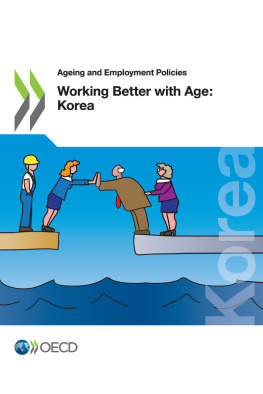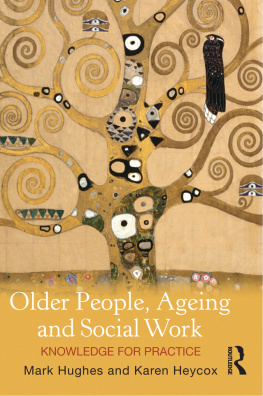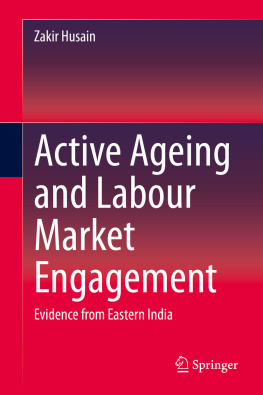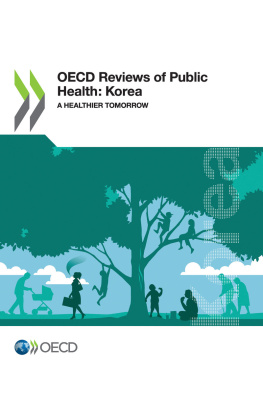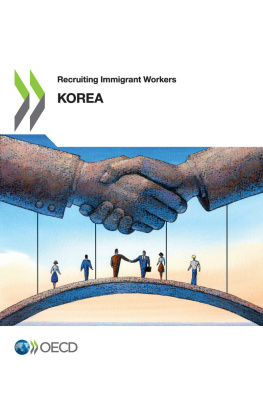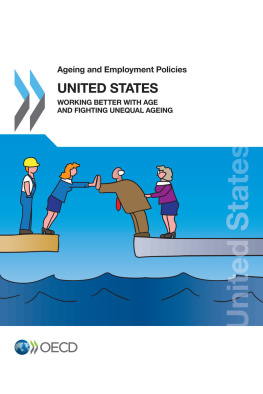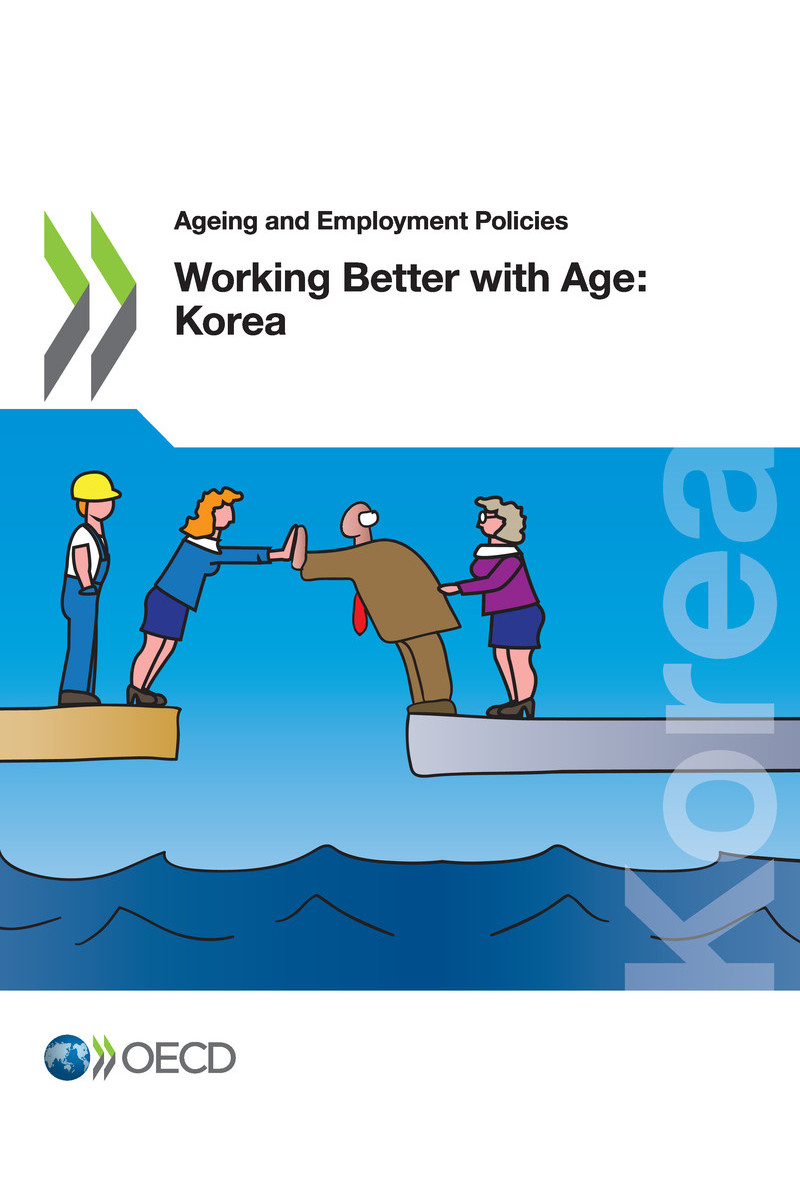Ageing and Employment Policies
Working Better with Age: Korea
Please cite this publication as:
OECD (2018), Working Better with Age: Korea , Ageing and Employment Policies, OECD Publishing, Paris.
https://doi.org/10.1787/9789264208261-en
Metadata, Legal and Rights
ISBN: 978-92-64-06483-6 (print) - 978-92-64-20826-1 (pdf) - 978-92-64-30808-4 (HTML) - 978-92-64-30807-7 (epub)
DOI: https://doi.org/10.1787/9789264208261-en
Series: Ageing and Employment Policies
ISSN: 1990-102X (print) - 1990-1011 (online)
This work is published under the responsibility of the Secretary-General of the OECD. The opinions expressed and arguments employed herein do not necessarily reflect the official views of OECD member countries.
This document, as well as any data and any map included herein, are without prejudice to the status of or sovereignty over any territory, to the delimitation of international frontiers and boundaries and to the name of any territory, city or area.
The statistical data for Israel are supplied by and under the responsibility of the relevant Israeli authorities. The use of such data by the OECD is without prejudice to the status of the Golan Heights, East Jerusalem and Israeli settlements in the West Bank under the terms of international law.
Photo credits: Cover iStockphoto.com/MirekP.
Corrigenda to OECD publications may be found on line at: www.oecd.org/publishing/corrigenda .
OECD 2018
You can copy, download or print OECD content for your own use, and you can include excerpts from OECD publications, databases and multimedia products in your own documents, presentations, blogs, websites and teaching materials, provided that suitable acknowledgement of OECD as source and copyright owner is given. All requests for public or commercial use and translation rights should be submitted to .
Foreword
The average age of the population of OECD countries is increasing fast, and the average age of the labour force is also increasing. In such a context, giving older people better work choices and incentives and access to good jobs is crucial for promoting economic growth and improving the sustainability of public social expenditures. Older people offer tremendous potential value to businesses and the economy but public policies and private workplace practices continue to pose barriers to work or fail to provide good work.
To respond to the continued disadvantage older people are facing in the labour market, the OECD Employment, Labour and Social Affairs Committee decided to carry out a new series of policy reviews on Working Better with Age to encourage greater labour market participation at an older age, through the fostering of employability, job mobility and labour demand. It builds upon earlier work of the OECD on Ageing and Employment Policies, summarised in Live Longer, Work Longer , published in 2006.
This report on Korea is one in a series of country case studies on this matter. It points to areas where changes are needed to improve employment opportunities, working conditions and work incentives at an older age, including measures to adapt wage-setting practices, tackle age discrimination, improve job skills of older people and their working conditions, and better activate older job seekers. It also reviews Koreas policies against the Recommendation of the Council on Ageing and Employment Policies which was formally endorsed by ministers of employment from all OECD countries in January 2016 (see https://legalinstruments.oecd.org/en/instruments/OECD-LEGAL-0419 ).
This review was carried out by OECDs Directorate for Employment, Labour and Social Affairs. This report on Korea was prepared by Anne Saint-Martin, Veerle Miranda, Christopher Prinz (project leader), Marko Stermsek, Hyeongso Ha and Anne Sonnet. Dana Blumin provided the statistical work and Monica Meza-Essid provided technical assistance. The report also includes comments to an earlier version from Mark Keese and from a number of Korean ministries and authorities.
Acronyms and abbreviations
AARP
American Association of Retired Persons
ALMPs
Active Labour Market Programmes
BLSP
Basic Livelihood Security Programme
CLA
Collective Labour Agreement
CHAMP
National Human Resources Development Consortium programme
DRA
Default Retirement Age
EITC
Earned Income Tax Credit
ESPP
Employment Success Package Programme
GDP
Gross Domestic Product
HRM
Human Resources Management
IRP
Individual Retirement Pension
ITA
Individual Training Accounts
KFTU
Korea Federation of Trade Unions
KOSIS
Korean Statistical Information Service
MOEL
Ministry of Employment and Labor
NCS
National Competency Standards
NHRC
National Human Rights Commission
NPS
National Pension Scheme
PES
Public Employment Service
PIAAC
OECD Survey of Adult Skills
SMEs
Small and Medium-sized Enterprises
TWAs
Temporary Work Agencies
VET
Vocational Education and Training
Executive summary
Korea is experiencing much faster population ageing than any other OECD country. If nothing is done to improve the labour market situation of older workers, this could put a brake on the trend of rising living standards observed in recent decades. There is no time for complacency: the median age of the population is projected to increase from 41 years today to 55 years in the mid-2050s, and the old-age dependency ratio (population aged 65 plus over the population aged 15-64) is projected to increase from 20% today to around 70% in 2050, 20 percentage points above the then OECD average.
In a nutshell, the key challenge is to increase the quality of life and work of older workers whilst maintaining their high employment rate. Unlike in many other OECD countries, there is little choice but to work for older workers in Korea; yet work is not an effective antidote against poverty when getting old. Most people end up in poor quality jobs after ending their core career in their early 50s, with low and insecure earnings and little or no social protection. Structural reforms are needed to reduce labour market duality, which affects older workers disproportionally. Measures should be taken to reduce i) the gap between wages and productivity, which increases with age and contributes to push older workers out of regular jobs, and ii) the gap in job quality between regular and non-regular jobs. This requires tackling employers practices with respect to early retirement plans while at the same time moving away from seniority-based practices for setting wages and granting promotions, reforming the hiring and dismissal rules for regular and non-regular work, and strengthening social protection. Providing good opportunities for workers to upgrade their skills and learn new ones throughout their working careers is also a key requirement for fostering longer working lives in good quality jobs.

